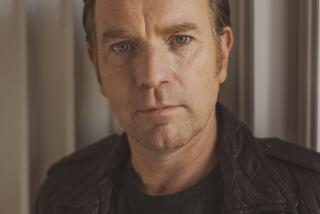Ironies of Film Acting: Overshadowed by TV : Roles: Don Ameche was from a likable line of actors who deserve to be remembered for more than their work on the tube.
- Share via
Don Ameche never became a great big TV star like some other actors of his generation--like Fred MacMurray and Robert Young, for instance.
Oh, the home screen did beckon to Ameche in the 1950s and ‘60s when he hosted such series as “Take a Chance,” “Coke Time With Eddie Fisher” and “International Showtime” and appeared in a variety program called “Holiday Hotel.” And, through the years, he had his share of those occasional parts that come to an actor with a solid reputation and a list of credits as long as your arm.
But, in a way, I’m pleased that Ameche, who died last week at 85, will be remembered mainly for the easygoing, durable charm that he brought to us in movie theaters rather than for the formula of a TV series.
An entire generation has grown up remembering MacMurray, a superb all-around movie performer, as a sitcom father in “My Three Sons.” The same generation recalls Young--another fine, understated actor--less for some of his notable films than for his series “Father Knows Best” and “Marcus Welby, M.D.”
There’s no doubt that such series were a cut above the rest. But television has such an awesomely suffocating presence that it tends to blot out the other work that accomplished artists do, which is often a pity.
For many people, Angela Lansbury will be remembered most for “Murder, She Wrote” rather than for her important stage work and such motion pictures as “State of the Union,” “The Manchurian Candidate” and “The Picture of Dorian Gray.”
Buddy Ebsen, a genial all-purpose actor and graceful hoofer who looked great in black tie, will be remembered most by the TV generation for “The Beverly Hillbillies.”
Is there any doubt that Candice Bergen, veteran of such films as “Carnal Knowledge,” “Rich and Famous” and “The Sand Pebbles,” now is pretty much branded as Murphy Brown?
Is it possible that Walter Brennan, one of the most honored supporting players in Hollywood history, will be fixed in the minds of many TV viewers for his role in “The Real McCoys” rather than his film contributions?
Aren’t you glad that Cary Grant never took the television series route?
*
In a nice bit of irony, television--mainly through such cable channels as American Movie Classics--is reminding us of some of the old and glorious (and not so glorious) work that our home-screen stars did in years past.
It is bracing--and often utterly surprising--to see them do what made them famous in the first place.
And it is particularly satisfying that the work of a performer such as Ameche--known mainly in recent years for the films “Cocoon” and “Trading Places”--is kept alive and shown to a new generation on cable.
Ameche, like MacMurray and Young, was not a landmark actor like Marlon Brando or Robert De Niro or Al Pacino or, going back, like Humphrey Bogart or James Cagney or Laurence Olivier or Clark Gable.
But when you watch him anew in such films as “Alexander’s Ragtime Band,” “The Story of Alexander Graham Bell,” “Heaven Can Wait,” “Down Argentine Way,” “In Old Chicago” and “Confirm or Deny,” you may not always be viewing a classic--but you somehow understand the magic of movies that last.
And there is something pretty comfortable about watching pros who are clearly working stiffs despite their stardom--men and women who may not be geniuses in their field but have managed to learn all the ropes, are eminently professional and, perhaps above all, are good company to spend a couple of hours with, often more so than glitzy headliners with bigger names.
For those who remember MacMurray mainly for “My Three Sons,” make a note to catch him when he shows up on TV in “Double Indemnity” or “The Apartment” or “The Egg and I” or “The Caine Mutiny”--all worthy films in which his ease and command is endlessly impressive and appealing.
I’ve caught him in countless other movies that probably amounted to very little, including one the other night in which he breezed through a musical number as easily as he seemed to breeze through just about everything. From “Alice Adams” to his later films like “The Absent Minded Professor,” I don’t remember ever being bored by him.
Just the other night, I also caught Young in “Crossfire,” an important 1947 film about anti-Semitism, and he was characteristically understated but splendid in a cast that also included Robert Ryan and Robert Mitchum. I admired Young in the romantic “Claudia” and “The Enchanted Cottage.” Like MacMurray and Ameche, he seems to have made about a million movies and lasted forever and, like them, invariably is simply forthright and pleasant on screen.
Don’t underestimate those qualities. Even among the neurotics and vulgarians who occasionally emerge as the stars of television series, plain likability remains a major factor in gaining admission to a viewer’s home--from Lansbury to Bergen, from Dick Van Dyke to Ted Danson, from Mary Tyler Moore to Johnny Carson, from Jerry Seinfeld to Robert Stack, from Lucille Ball to Bill Cosby, from Andy Griffith to John Goodman.
It’s difficult to imagine more flat-out likable TV stars than MacMurray and Young. Perhaps Ameche was a wee bit too elegant to fit the image of hail-fellow-well-met that works so well on TV. But, to me, he was a symbol of a captivating Hollywood era, when such folks as Alice Faye, Jack Oakie--and Ameche--were swell companions for a night on the town, singing, dancing, clowning, dramatizing and showing that innocence has its good side too.
More to Read
The complete guide to home viewing
Get Screen Gab for everything about the TV shows and streaming movies everyone’s talking about.
You may occasionally receive promotional content from the Los Angeles Times.






